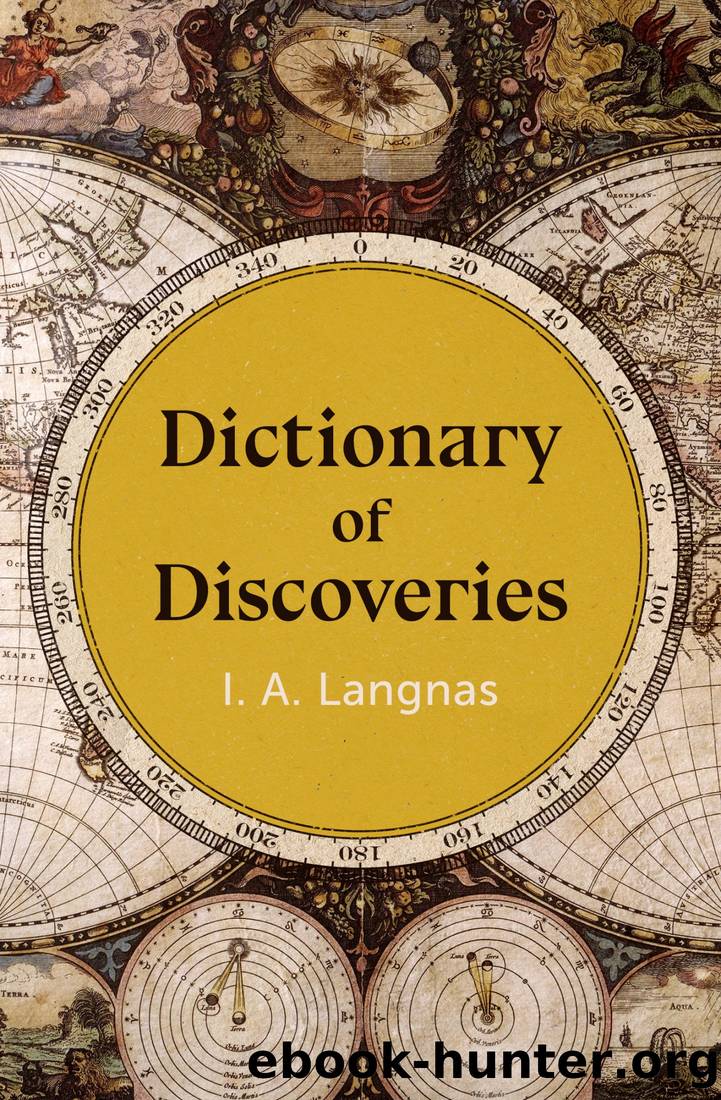Dictionary of Discoveries by I. A. Langnas

Author:I. A. Langnas [Langnas, I. A.]
Language: eng
Format: epub
Tags: reference, Curiosities & Wonders, Travel, Special Interest, Adventure, Dictionaries
ISBN: 9781504068024
Google: I8lGEAAAQBAJ
Publisher: Open Road Media
Published: 2021-10-26T23:48:34.228812+00:00
I
Ibn Batuta
Arab world traveler (1304â1378).
Born at Tangier; full name, Abu Abdullah ben Batuta Lahuati. Became enthusiastic about travel from reading travel books. Started in 1325 on a pilgrimage to Mecca, then visited parts of Asia, crossed the Red Sea into Ethiopia and Egypt, and returned to Mecca via the Persian Gulf. In a second voyage he wanted to go north from Bulgaria, but became lost in the southern Russian steppes and returned to Constantinople. The third voyage, the most notable, took him first to India, where he worked as judge for several years, then to the Maldive Islands, where he also served as judge, and then into China, which he visited as ambassador from the ruler of Delhi, Muhammed. He managed to reach Peking but soon had to turn back, and proceeded to Ceylon and Indonesia. He made his way back to China and finally returned home, after 25 yearsâ travel, 1350. In 1352 the Sultan of Morocco sent him on a mission across the Sahara, which took him to Timbuctoo. He returned to Fez, where he wrote a narrative of his travels and died. Only fragments of his book have been preserved.
Ibn Fodhlan, Ahmad
Arab traveler in eastern Europe (10th century).
The Abbasid Kaliph Al Muktadir sent him in 921-22 on a diplomatic mission to the ruler of the Volga Bulgarians. The narrative of his journey, of which extracts have been preserved, is a most important source of information on Russia, Poland, and eastern Europe generally. Ibn Fodhlanâs are, in many cases, the first reliable facts we have.
Ibn Haukal
Arab geographer and traveler (10th century).
Starting from Baghdad in 943, he spent the next thirty or forty years in traversing the Muslim countries. He used this experience to prepare a revised edition of a geography by Istakhri (977), which in turn was based on the work of Balki. Istakhri, whom he met on his travels in 950, recognized him as his master and asked him to revise his own work.
Ibn Jubair, Mohammed
Arab traveler (1145-after 1217).
Born at Valencia. Made a pilgrimage to Mecca in 1183, visited Iraq and Syria, and returned home in 1185 by way of Sicily and Granada. He made two more expeditions to the East, in 1189-91 and 1217, dying at Alexandria. The account of his travels has been preserved, and has been translated into English and Italian.
Ibn Khordadbeh
Arab geographer (about 820-912).
A postmaster in Persia, later a courtier at the court of the Abbasid Kaliph Al Mutamid (870-892) in Baghdad, in 846 he composed his âBook of Roads and Countriesâ for an Abbasid prince. This book, which he revised in 885, is a most important source for the geography of Western Asia.
Ibn Rosteh
Arab traveler in the Far East (about 900 A.D.).
A merchant who traveled extensively in southeast Asia, especially in the Kingdom of Sailendra (Malaya and Indonesia), and left a valuable account of his travels.
Ibn Wahab
Arab traveler in China (9th century A.D.).
Born in Basra, Iraq, a member of the Koreish family which produced Mohammed, from whom he claimed descent. He visited China 872 A.
Download
This site does not store any files on its server. We only index and link to content provided by other sites. Please contact the content providers to delete copyright contents if any and email us, we'll remove relevant links or contents immediately.
| Coloring Books for Grown-Ups | Humor |
| Movies | Performing Arts |
| Pop Culture | Puzzles & Games |
| Radio | Sheet Music & Scores |
| Television | Trivia & Fun Facts |
Spare by Prince Harry The Duke of Sussex(5197)
Paper Towns by Green John(5191)
Machine Learning at Scale with H2O by Gregory Keys | David Whiting(4313)
Never by Ken Follett(3957)
Fairy Tale by Stephen King(3399)
Learning C# by Developing Games with Unity 2021 by Harrison Ferrone(3354)
Reminders of Him: A Novel by Colleen Hoover(3121)
The Man Who Died Twice by Richard Osman(3080)
Fantastic Beasts and Where to Find Them: Illustrated edition by J.K. Rowling & Newt Scamander(3027)
Will by Will Smith(2920)
0041152001443424520 .pdf by Unknown(2846)
How The Mind Works by Steven Pinker(2816)
Never Lie: An addictive psychological thriller by Freida McFadden(2623)
Fantastic Beasts and Where to Find Them: The Original Screenplay by J. K. Rowling(2518)
It Starts With Us (It Ends with Us #2) by Colleen Hoover(2367)
Rationality by Steven Pinker(2366)
Borders by unknow(2315)
The God delusion by Richard Dawkins(2309)
Friends, Lovers, and the Big Terrible Thing by Matthew Perry(2230)
